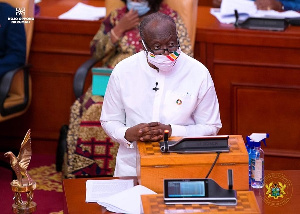 Finance Minister, Ken Ofori-Atta
Finance Minister, Ken Ofori-Atta
The mid-year budget is here and once again, the citizenry will be looking at government to account for how much has gone out from the public purse and how much has come in. But more importantly, this time what most people, especially the youth, are more concerned about is what plans are in place to create jobs for them.
And indeed, those are legitimate concerns. According to World Bank data, about 110,000 students graduate from the country’s tertiary institutions each year – and the Institute of Social, Statistical and Economic Research (ISSER) estimates that only about 10 percent of graduates get jobs in their first year. That is no exaggeration, as anecdotal evidence supports this estimation.
Just a few days ago, it was an eye-sore and in fact a disheartening scene to see a great multitude of young people throng the El-Wak sports stadium and its surrounding streets just to acquire recruitment forms of the Ghana Armed Forces – a profession that has never been the target the graduates but is now being rushed.
What this means is that job searches are no longer about what a person prefers or the programme studied in school. It is all about where there is the slightest chance of recruitment, then there is a scramble and blip. Once it will bring income, every other factor is placed on the back-burner. Yes, that is how dire and desperate the situation has become for the youth. So, it is not out of place at all for the teeming youth to enquire what jobs government will make available for them in the next few years.
Quite interestingly, the president had indicated earlier that the mid-year budget is stocked with such goodies. When he graced this year’s Eid-ul-Adha celebrations on Tuesday, July 20, 2021, President Akufo-Addo emphatically said the mid-year budget will lay out plans to create one million jobs through the Ghana Coronavirus Alleviation and Revitalisation of Enterprises Support (Ghana CARES) programme. “Yes, one million jobs,” he said.
“As has been well-publicised, a few days ago the Ministry of Finance granted financial clearance to the Ministry of Education and security services for the recruitment of some 11,800 people to beef-up their operations. It does not end there. We will through interventions to be set out in the mid-year budget review announce plans for the creation of some one million more jobs under the Ghana CARES ‘Obaatampa’ project over the course of the next 3 years.
“We are determined to pursue our agenda for jobs creation in order to give opportunities for our youth to nurture their talent for the development of our country,” the president said.
On paper, this is music to the ears of anyone who hears this from the nation’s president. But there are some burning questions regarding this promise. Is it going to be just one of those political gimmicks? Are there really concrete plans on the board to see this happening? Are the jobs going to be sustainable, or it is going to be like what has come to be known as the Nation’s Builders Corp (NaBCo), under which those employed are always crying for their salaries? And more importantly, does government have adequate finances to carry out this ambitious project?
The first three questions may be easy for the politicians to find their way around – but the last question is where they will find difficulty, taking into consideration the reality on the ground. Remember, the Ghana CARES programme’s financial structure is one that has always been doubtful since it was first announced.
The GH¢100billion project seeks to raise 70 percent of funds from the private sector – a goal that seems over-ambitious and unrealistic, given the impact of the pandemic on the private sector. And what’s more, government has struggled to say how it will source that whopping amount from the private sector – whether it will be through donations, taxes or any other means.
And even with government’s planned contribution of 30 percent to the Ghana CARES programme, doubts remain as the figures don’t look good for it to be able to raise that amount; except through the usual means – borrowing. But that will also come at great cost to government, as interest payment on loans is now the leading expenditure item on the public purse.
The statistical bulletin data for the first quarter shows interest payment on debt, together with compensation for government employees, outpaced money generated in the domestic economy by 24.4 percent. According the data, the country generated GH¢12.5billion from the domestic economy as of first quarter of 2021; but spent GH¢8.billion on interest payment and GH¢7.3billion on compensation of employees, taking the total figure to GH¢15.6billion.
This simply means government had to borrow in excess of GH¢3billion to cover these two basic obligatory expenditures. Besides these two, other expenditures of government amounted GH¢23.4billion in the period under discussion – pushing government to borrow more than GH¢11billion to cover all its expenditure incurred in the first quarter.
So, with the poor performance of tax revenue which has resulted in tax to GDP averaging 12 percent in the past five years against the 25 percent benchmark for middle-income countries, government finds itself in a very tightcorner to get a breathing space to cough-up its share of GH¢30billion for the Ghana CARES programme.
But in any case, that kind of miracle is what the citizenry is expecting from its government. Whatever the situation, Finance Minister Ken Ofori-Atta is the man in the right position to unveil the plan.
Whatever the case, there is only one thing the youth are looking forward to – jobs. So, if the president says the Ghana CARES programme is what will deliver those jobs, so be it. But what the people consider more important is that the promised 1 million jobs must be real and sustainable – not mere political rhetoric or a gimmick.